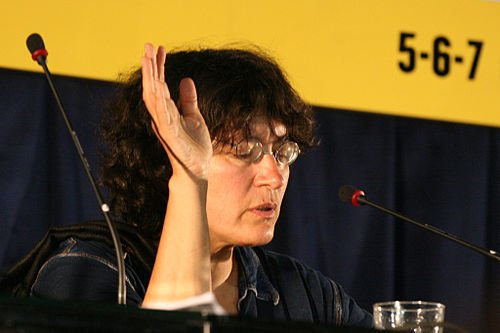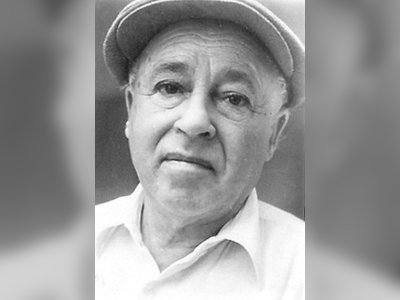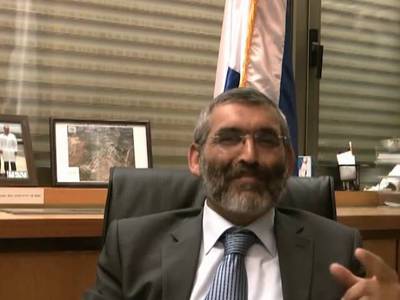Amira Hass
Amira Hass (born June 28, 1956) is an Israeli journalist and columnist known for her work at the newspaper "Haaretz," where she extensively covers the Palestinian Authority and Palestinian society, primarily from her residence in Ramallah.
Biography
Hass was born in Jerusalem to parents who were Holocaust survivors and members of the Communist movement. Her father, Avraham, a native of Romania, was an activist in the Communist Party and later elected to its central committee. Her mother, Hannah (née Levi), born in Serbia, was also a communist activist who joined Tito's partisans.
After World War II, her parents immigrated to Israel and initially lived in Jerusalem. In her book "Drinking from the Sea of Gaza," Hass recounts that her mother's story from the Holocaust influenced her decision, at a young age, not to be a bystander when witnessing injustice.
Amira Hass began her career as a journalist in 1989. She worked as a correspondent in Romania during the post-communist era. In 1991, she was appointed as a correspondent for Palestinian affairs by the newspaper "Haaretz."
Hass learned Arabic and decided to reside in the Gaza Strip to closely examine the affairs of the Palestinian Authority and Palestinian society. She managed to establish close relationships with activists in Fatah, notably Mahmoud Abbas (Abu Mazen), who would later become the head of the Palestinian Authority. Later on, she moved to live in Ramallah, dividing her time between her Ramallah apartment and one in Tel Aviv.
Hass has been recognized with several international awards for her human rights activism, including the Bruno Kreisky Human Rights Award (2002), the UNESCO/Guillermo Cano World Press Freedom Prize (2003), and the Anna Lindh Foundation Award (2004). In 2009, she received the Lifetime Achievement Award from the International Women's Media Foundation. In the same year, she was also awarded the "Press Freedom Prize" by Reporters Without Borders for her coverage of Operation Cast Lead in Gaza.
Ami Ayalon, who served as the head of the Shin Bet from 1996 to 2000, praised Hass's articles as providing a very accurate and authentic picture of the Palestinian society in the eyes of Palestinians. He noted that since he needed to consider what Palestinians thought and how they behaved as part of defining or understanding the reality, one article by Amira Hass provided him with a much better picture than a report from an agent trying to deal with the same issue.
In the realm of cinema, Yaffa Kedar and producer Yossi Leon documented Amira Hass's life and work in the film "Where Are You Going?" filmed in 2000, shortly before the outbreak of the Second Intifada, and released in late 2001. The film won the "In Spirit of Freedom" award at the Jerusalem Film Festival.
In June 2001, the Jerusalem Magistrate's Court ordered Haaretz newspaper to pay 250,000 NIS to Hebron settlers after the newspaper did not submit a defense in a defamation suit filed by Jewish residents who claimed that the journalist had falsely reported that some of them (residents of Beit Hadassah) had danced around the body of a terrorist, kicked it, stepped on it, and distributed sweets to soldiers who had shot and killed the terrorist after he fired at them. The ruling was given in a default judgment as the newspaper's defense was not submitted.
In September 2014, Hass was banned from entering Birzeit University due to her status as an Israeli Jew. In response, she stated, "I understand the emotional need of Palestinians to create a space free of Israeli citizens who enjoy privileges and deny their rights, and oppress them from their land. As a leftist, I am skeptical about the anti-colonialist logic of boycotting left-wing Jewish Israelis. In any case, these activists are not seeking a kashrut certificate to oppose the occupation and the privileges of Jewish Israelis and act to mitigate it."
Her Stance
Amira Hass holds the view that the Oslo Accords did not end Israel's control over the West Bank and Gaza Strip and that the agreements have become a mechanism for the continued occupation through different means. In her writings on the Israeli-Palestinian conflict, she expresses solidarity with the Palestinian side, focusing on the suffering of Palestinians and offering sharp criticism of Israel's policies in the occupied territories. Her views have often made her a target of verbal attacks from Israelis.
Hass criticizes corruption within the Palestinian Authority and argues that it prioritizes its interests over those of Palestinian residents. She also accuses it of suppressing the activities of Hamas members in the West Bank.
On April 3, 2013, she published an article in Haaretz that began with the words, "Stone-throwing is the birthright and duty of anyone subject to foreign rule," but she later clarified that this right has limits, such as "distinguishing between civilians and those in uniform, as well as between children and adults."
Amira Hass's work and writing reflect a complex perspective on the Israeli-Palestinian conflict, and she continues to be an influential figure in the realm of journalism and human rights activism.
- עמירה הסhe.wikipedia.org






